英国诺丁汉大学环境科学专业介绍(英文)
英国大学环境专业以及申请要求

英国大学环境专业以及申请要求
现在,无论是国家还是普通民众对于环境的问题都更加的关注,而学习环境专业则是一个不错的选择,那么接下来就和来看看英国大学环境专业以及申请要求。
环境科学专业
环境科学专业属于环保专业的分之专业,属于交叉学科,主要研究两个方面:一是我们自然环境的物料和生物变化过程,二是解决环境问题的科学方法和应用。
职业导向一般有:科研人员、大学教授、高中老师、环境问题顾问及律师,相关政府职能部门官员等。
英国环境科学专业院校推荐
英国有百余所学校开设了环境科学类研究生专业,专业总数近五百个,是国际学生申请的热门专业之一。
通过文、理、工、管理相互渗透,并与全球环境及国际型人才培养模式接轨,使本专业培养的学生具备环境科学的基本理论、基本知识和基本技能,受到很好的科学研究的基本训练,具有分析和解决问题的能力,培养掌握国内外环境科学发展状况、熟悉国内外环境立法、执法机制及其在社会经济可持续发展宏观决策中的作用的文、理、工、管理兼备的复合型环境科学人才。
申请要求:英国大多数院校要求雅思成绩最低是6分,但一般6.5分以上比较有把握,其中要求阅读部分是6分,如果是托福的话,最低也要80分。
推荐院校:东英吉利大学、利兹大学、埃克塞特大学、利物浦大学。
爱丁堡大学

爱丁堡大学(University of Edinburgh)位于苏格兰的首府爱丁堡市,成立于1583年,是英国第6古老的大学。
2010年英国大学times综合排名14。
很多同学在选择英国留学时往往,还对英国大学的各种情况不甚明了,尤其对于英国哪些专业适合就业也不了解,其实英国大多数学校教学实力都非常强,不论哪所都可以说是名校,但英国的专业之间差距却很大,所以选择一门热门专业我,往往要比申请一所名校要重要的多,下面我们就来了解一下英国的热门专业。
1.英国留学热门专业——建筑学英国建筑学在国际上享有极高的声誉和地位。
主要名校有:谢菲尔德大学(University of Sheffield),该校建筑学的教学水平和研究水平在国际学术界享有很高的声誉,教学水平获得Excellent,研究水平得到5分。
爱丁堡大学(The University of Edinburgh),其建筑专业高居于专业前十强。
专业涵盖:建筑设计、建筑史和建筑学等方向。
另外,曼彻斯特大学、女王大学贝尔法斯特、利兹城市大学、卡迪夫大学都在建筑学专业有很高水平。
2.英国留学热门专业——教育学英国大学教育学实力排名为:Bristol、Sheffield、Cambridge、Warwick、Leicester、Leeds Metropolitan、Exeter、Cardiff、Aberdeen、Bath、King’s College、Keel、Dundee、Goldsmiths College、Queens Belfast、London South Bank、Surrey、Durham、York、Edinburgh。
3.英国留学热门专业——计算机与ITIT业是国内就业市场的“需才大户”,在此背景下,每年赴英留学人员中有25%的人选择IT及相关专业。
但从国内就业市场的行情看,传统的IT人才已趋饱和,而在移动通信、电子消费品生产方面以及网络通信、网络安全等新兴领域,人才需求量却很大。
英国环境科学类专业硕士的最新介绍

英国环境科学类专业硕士的最新介绍当前我国的环境问题越发严重,近年来越来越多的人投入到环境保护行列,因而也促生了很多赴英国读环境科学类专业的留学生。
在英国,有百余所学校开设环境科学类研究生专业,专业总数近五百门,是国际学生进行申请的热门专业之一,也是新兴的热门专业之一。
专业名称:英国环境科学类专业硕士学制:通常为一年英国环境科学类专业硕士留学方向:英国环境科学类专业方向有环境管理、环境的可持续性发展、环境与健康、自然科学、生态环境管理、碳管理、气候变化、大气科学等。
这些专业的侧重点各有不同:环境管理专业:环境管理专业教授学生管理不断变化环境的知识,包括气候变化等,并利用生物技术使环境呈现良性发展。
环境可持续性专业:环境管理专业主要侧重于环境的可持续性发展方面并针对此问题进行深入学习与研究,从而利用知识与先进技术促进人与环境的和谐发展。
环境与健康专业:环境与健康专业侧重于通过分析影响人类身体健康的环境因素,从而找寻适当的改善方法等。
环境科学类专业大学推荐利兹大学(Unviersity of Leeds)的环境系开设了相当多的研究生课程,你可以根据自己未来发展方向选择对口专业。
今年新增的专业是MSc Sustainability (Climate Change) ,综合可持续发展、气候变化和制定政策等知识,学生们将广泛了解当前就气候变化产生的辩论议题,研究利用各种政策加强环保的效果。
埃克塞特大学(University of Exeter)的气候变化与风险管理硕士课程围绕目前气候变化的主要议题,包括研究经济、人类健康以及生态环境变化的过程,掌握研究气候变化的科学方法以及评估气候变化风险性的方式。
学生在学习期间要参与实际研究项目,结合英国当地气象中心的最新数据,使用世界领先的研究气象的模式,尽可能解决现存的问题,提出可行的措施。
利物浦大学(University of Liverpool)地理学系设立了环境及气候变化的研究生课程。
英国留学大学能源硕士专业介绍

英国留学大学能源硕士专业介绍①UniversityofLeeds利兹大学Leeds利兹大学的MScEnergyandEnvironment侧重于学习新能源以及传统能源技术、可再生能源、固体废物回收、空气污染、气候变化和能源管理系统的专业知识,让学生了解能源技术选择对环境的影响,并进一步培养专业化能源技术,该专业经由EI能源学会认证。
下半个学期里,学生有机会和世界顶尖研究机构的专家一起完成研究项目,先进研究设备什么的自然少不了。
开设的必修课有:研究项目、污染物采样与分析、可再生能源技术、大气污染|影响与调控、先进的可再生能源技术等,考核方式:案例研究、技术报告、presentation、随堂测试、考试等。
入学要求:工程、物理科学或数学专业背景;本科均分75-80以上(leeds有自己的list);雅思6.5,单项不低于6.0②CranfieldUniversity克兰菲尔德大学Cranfield克兰菲尔德大学的MScRenewableEnergyEngineering(2018年有可能和其他专业合并为MScRenewableEnergy,当前还在审核中)旨在培养学生可再生能源转换系统所需要的可再生能源工程技术的知识、基本理解和批判性意识,该专业经由IMechE英国机械工程师学会认证。
课程安排比较紧密,一般一到两周学完一门课程,设置有实践性较强的小组项目,开设的必修课有:流体动力装置动力学、风险与可靠性工程、结构完整性、工程管理、工程应力分析|理论与模拟、可再生能源计算流体学、电力电子与机器、专业认证测试与途径等,考核方式:课程作业等。
申请要求:数学、物理或工程专业背景,可考虑相关工作经验。
MScRenewableEnergy(还在审核中),分为工程方向和管理方向。
课程设置和MScRenewableEnergyEngineering有些区别,基本上一周读完一门课程,开设的必修课有:可再生能源技术原理、后生代工程、风险与可靠性工程、工程应力分析|理论与模拟、技术管理、能源系统案例研究、流体力学与装载(工程方向)、健康安全与环境和可靠性工程与评估风险管理(管理方向)等,考核方式:课程作业等。
诺丁汉大学英文简介

English language support
• CELቤተ መጻሕፍቲ ባይዱ International
The Centre for English Language Education (CELE) operates on both the University of Nottingham’s international campuses. To provide ongoing support for students at any stage of their academic careers, the Centre also offers Insessional classes and individual support for all students. Finally, students who need to improve their language level before enrolling on their degree can join the pre-sessional classes.
The campus is located in Ningbo, a historic city on China's eastern coast close to Shanghai, and has been developed in partnership with the dynamic and innovative Wanli Education Group.
excellent graduate
Ian paker
• • • • • • • The University of Nottingham University Park Nottingham NG7 2RD UK T: +44 (0) 115 951 5151 F: +44 (0) 115 951 3666
英国爱丁堡大学优势专业推荐之生态与环境科学专业.doc
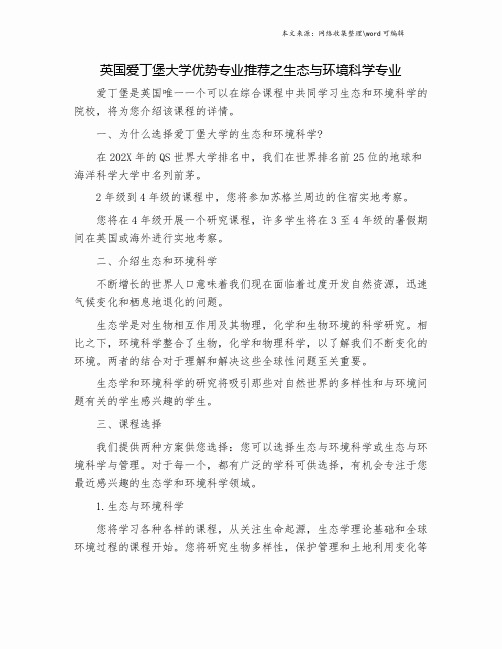
英国爱丁堡大学优势专业推荐之生态与环境科学专业爱丁堡是英国唯一一个可以在综合课程中共同学习生态和环境科学的院校,将为您介绍该课程的详情。
一、为什么选择爱丁堡大学的生态和环境科学?在202X年的QS世界大学排名中,我们在世界排名前25位的地球和海洋科学大学中名列前茅。
2年级到4年级的课程中,您将参加苏格兰周边的住宿实地考察。
您将在4年级开展一个研究课程,许多学生将在3至4年级的暑假期间在英国或海外进行实地考察。
二、介绍生态和环境科学不断增长的世界人口意味着我们现在面临着过度开发自然资源,迅速气候变化和栖息地退化的问题。
生态学是对生物相互作用及其物理,化学和生物环境的科学研究。
相比之下,环境科学整合了生物,化学和物理科学,以了解我们不断变化的环境。
两者的结合对于理解和解决这些全球性问题至关重要。
生态学和环境科学的研究将吸引那些对自然世界的多样性和与环境问题有关的学生感兴趣的学生。
三、课程选择我们提供两种方案供您选择:您可以选择生态与环境科学或生态与环境科学与管理。
对于每一个,都有广泛的学科可供选择,有机会专注于您最近感兴趣的生态学和环境科学领域。
1.生态与环境科学您将学习各种各样的课程,从关注生命起源,生态学理论基础和全球环境过程的课程开始。
您将研究生物多样性,保护管理和土地利用变化等学科,同时也对物理,化学和生物科学有广泛的了解。
通过实地研究和授课,您将发现并测试生态和环境分析中使用的方法。
在该课程的后期,您将探索水资源管理,土地利用,环境污染和环境建模等学科。
参与这些学科领域的高级研究的工作人员将教授您。
您将有机会进行研究课程,包括4年级的独立研究课程,并将完成实地和实验室任务,包括至少在苏格兰进行为期三周的实地考察。
该课程将为您提供解决环境问题的技能和知识,设计强有力的样本采集策略,进行生态和环境测量,评估结果的重要性以及管理保护和环境保护课程。
2.生态环境科学与管理您可以将您对生态和环境科学的研究与管理研究结合起来。
英国留学诺丁汉大学费用和优势专业一览
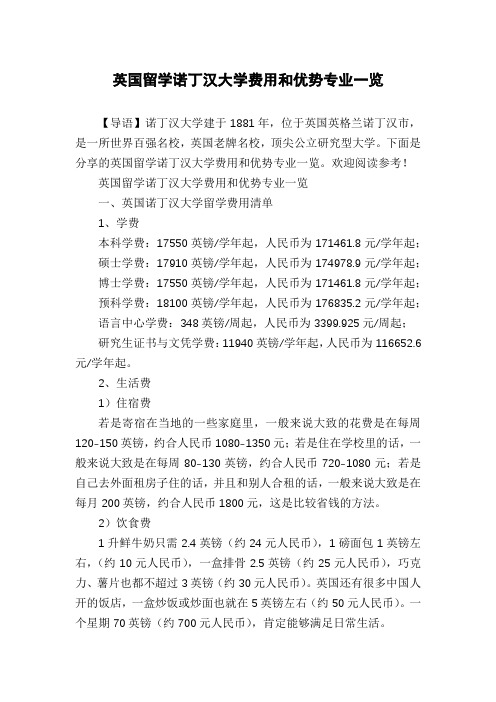
英国留学诺丁汉大学费用和优势专业一览【导语】诺丁汉大学建于1881年,位于英国英格兰诺丁汉市,是一所世界百强名校,英国老牌名校,顶尖公立研究型大学。
下面是分享的英国留学诺丁汉大学费用和优势专业一览。
欢迎阅读参考!英国留学诺丁汉大学费用和优势专业一览一、英国诺丁汉大学留学费用清单1、学费本科学费:17550英镑/学年起,人民币为171461.8元/学年起;硕士学费:17910英镑/学年起,人民币为174978.9元/学年起;博士学费:17550英镑/学年起,人民币为171461.8元/学年起;预科学费:18100英镑/学年起,人民币为176835.2元/学年起;语言中心学费:348英镑/周起,人民币为3399.925元/周起;研究生证书与文凭学费:11940英镑/学年起,人民币为116652.6元/学年起。
2、生活费1)住宿费若是寄宿在当地的一些家庭里,一般来说大致的花费是在每周120-150英镑,约合人民币1080-1350元;若是住在学校里的话,一般来说大致是在每周80-130英镑,约合人民币720-1080元;若是自己去外面租房子住的话,并且和别人合租的话,一般来说大致是在每月200英镑,约合人民币1800元,这是比较省钱的方法。
2)饮食费1升鲜牛奶只需2.4英镑(约24元人民币),1磅面包1英镑左右,(约10元人民币),一盒排骨2.5英镑(约25元人民币),巧克力、薯片也都不超过3英镑(约30元人民币)。
英国还有很多中国人开的饭店,一盒炒饭或炒面也就在5英镑左右(约50元人民币)。
一个星期70英镑(约700元人民币),肯定能够满足日常生活。
3)交通费公交车平均价格1英镑(约10元人民币),但是学生可以办优惠的季度票,一个季度80英镑左右(约800元人民币)。
出租车票价很贵,打车距离不远的话,大概10-15英镑(约100-150元人民币)。
但是对于那些住在学校宿舍的学生来说,就可以省了交通费用。
英国诺丁汉大学专业课程设置及奖学金设置简介
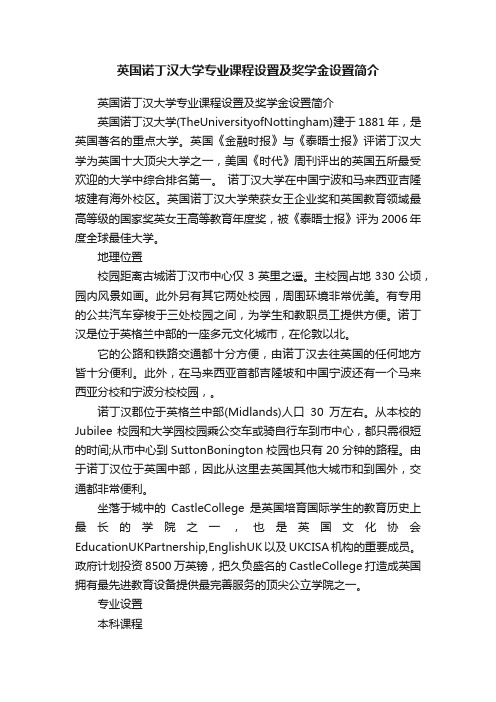
英国诺丁汉大学专业课程设置及奖学金设置简介英国诺丁汉大学专业课程设置及奖学金设置简介英国诺丁汉大学(TheUniversityofNottingham)建于1881年,是英国著名的重点大学。
英国《金融时报》与《泰晤士报》评诺丁汉大学为英国十大顶尖大学之一,美国《时代》周刊评出的英国五所最受欢迎的大学中综合排名第一。
诺丁汉大学在中国宁波和马来西亚吉隆坡建有海外校区。
英国诺丁汉大学荣获女王企业奖和英国教育领域最高等级的国家奖英女王高等教育年度奖,被《泰晤士报》评为2006年度全球最佳大学。
地理位置校园距离古城诺丁汉市中心仅3英里之遥。
主校园占地330公顷,园内风景如画。
此外另有其它两处校园,周围环境非常优美。
有专用的公共汽车穿梭于三处校园之间,为学生和教职员工提供方便。
诺丁汉是位于英格兰中部的一座多元文化城市,在伦敦以北。
它的公路和铁路交通都十分方便,由诺丁汉去往英国的任何地方皆十分便利。
此外,在马来西亚首都吉隆坡和中国宁波还有一个马来西亚分校和宁波分校校园,。
诺丁汉郡位于英格兰中部(Midlands)人口30万左右。
从本校的Jubilee校园和大学园校园乘公交车或骑自行车到市中心,都只需很短的时间;从市中心到SuttonBonington校园也只有20分钟的路程。
由于诺丁汉位于英国中部,因此从这里去英国其他大城市和到国外,交通都非常便利。
坐落于城中的CastleCollege是英国培育国际学生的教育历史上最长的学院之一,也是英国文化协会EducationUKPartnership,EnglishUK以及UKCISA机构的重要成员。
政府计划投资8500万英镑,把久负盛名的CastleCollege打造成英国拥有最先进教育设备提供最完善服务的顶尖公立学院之一。
专业设置本科课程艺术、英语、历史、现代语言和文化、经济学、政治和国际关系、神学与宗教研究、土木工程、机械工程、生物学、数学、自然科学、药理学、物理与天文学、心理学、兽医学等。
英国环境工程专业详细解析
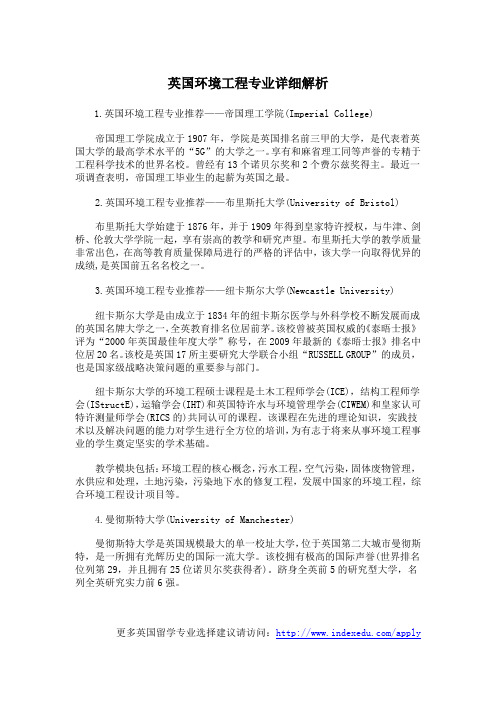
英国环境工程专业详细解析1.英国环境工程专业推荐——帝国理工学院(Imperial College)帝国理工学院成立于1907年,学院是英国排名前三甲的大学,是代表着英国大学的最高学术水平的“5G”的大学之一。
享有和麻省理工同等声誉的专精于工程科学技术的世界名校。
曾经有13个诺贝尔奖和2个费尔兹奖得主。
最近一项调查表明,帝国理工毕业生的起薪为英国之最。
2.英国环境工程专业推荐——布里斯托大学(University of Bristol)布里斯托大学始建于1876年,并于1909年得到皇家特许授权,与牛津、剑桥、伦敦大学学院一起,享有崇高的教学和研究声望。
布里斯托大学的教学质量非常出色,在高等教育质量保障局进行的严格的评估中,该大学一向取得优异的成绩,是英国前五名名校之一。
3.英国环境工程专业推荐——纽卡斯尔大学(Newcastle University)纽卡斯尔大学是由成立于1834年的纽卡斯尔医学与外科学校不断发展而成的英国名牌大学之一,全英教育排名位居前茅。
该校曾被英国权威的《泰晤士报》评为“2000年英国最佳年度大学”称号,在2009年最新的《泰晤士报》排名中位居20名。
该校是英国17所主要研究大学联合小组“RUSSELL GROUP”的成员,也是国家级战略决策问题的重要参与部门。
纽卡斯尔大学的环境工程硕士课程是土木工程师学会(ICE),结构工程师学会(IStructE),运输学会(IHT)和英国特许水与环境管理学会(CIWEM)和皇家认可特许测量师学会(RICS的)共同认可的课程。
该课程在先进的理论知识,实践技术以及解决问题的能力对学生进行全方位的培训,为有志于将来从事环境工程事业的学生奠定坚实的学术基础。
教学模块包括:环境工程的核心概念,污水工程,空气污染,固体废物管理,水供应和处理,土地污染,污染地下水的修复工程,发展中国家的环境工程,综合环境工程设计项目等。
4.曼彻斯特大学(University of Manchester)曼彻斯特大学是英国规模最大的单一校址大学,位于英国第二大城市曼彻斯特,是一所拥有光辉历史的国际一流大学。
诺丁汉大学最好的专业及申请条件
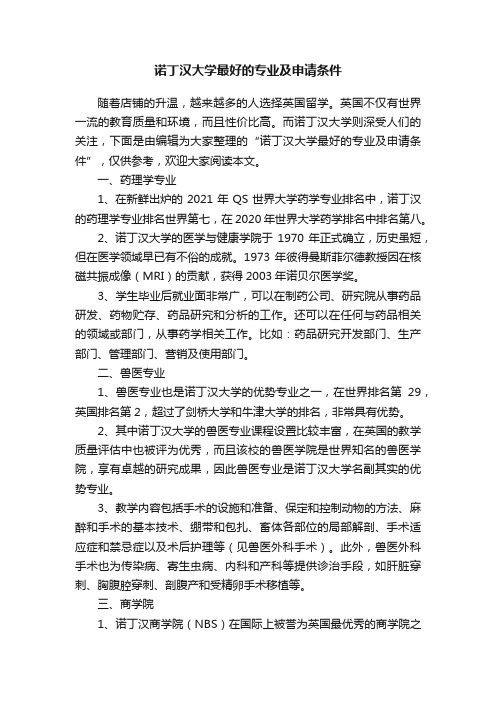
诺丁汉大学最好的专业及申请条件随着店铺的升温,越来越多的人选择英国留学。
英国不仅有世界一流的教育质量和环境,而且性价比高。
而诺丁汉大学则深受人们的关注,下面是由编辑为大家整理的“诺丁汉大学最好的专业及申请条件”,仅供参考,欢迎大家阅读本文。
一、药理学专业1、在新鲜出炉的2021年QS世界大学药学专业排名中,诺丁汉的药理学专业排名世界第七,在2020年世界大学药学排名中排名第八。
2、诺丁汉大学的医学与健康学院于1970年正式确立,历史虽短,但在医学领域早已有不俗的成就。
1973年彼得曼斯菲尔德教授因在核磁共振成像(MRI)的贡献,获得2003年诺贝尔医学奖。
3、学生毕业后就业面非常广,可以在制药公司、研究院从事药品研发、药物贮存、药品研究和分析的工作。
还可以在任何与药品相关的领域或部门,从事药学相关工作。
比如:药品研究开发部门、生产部门、管理部门、营销及使用部门。
二、兽医专业1、兽医专业也是诺丁汉大学的优势专业之一,在世界排名第29,英国排名第2,超过了剑桥大学和牛津大学的排名,非常具有优势。
2、其中诺丁汉大学的兽医专业课程设置比较丰富,在英国的教学质量评估中也被评为优秀,而且该校的兽医学院是世界知名的兽医学院,享有卓越的研究成果,因此兽医专业是诺丁汉大学名副其实的优势专业。
3、教学内容包括手术的设施和准备、保定和控制动物的方法、麻醉和手术的基本技术、绷带和包扎、畜体各部位的局部解剖、手术适应症和禁忌症以及术后护理等(见兽医外科手术)。
此外,兽医外科手术也为传染病、寄生虫病、内科和产科等提供诊治手段,如肝脏穿刺、胸腹腔穿刺、剖腹产和受精卵手术移植等。
三、商学院1、诺丁汉商学院(NBS)在国际上被誉为英国最优秀的商学院之一。
NBS不仅通过了EPAS认证,被HEFCE基金会评为最优秀商学院之一,还因为其高水准的设施、国际化水平和教学质量被QS星级计划评为五星商学院。
2、学院设有管理,人力资源,金融,创业,国际商务等共7个专业学位19门专业课程。
环境科学与工程专业英语
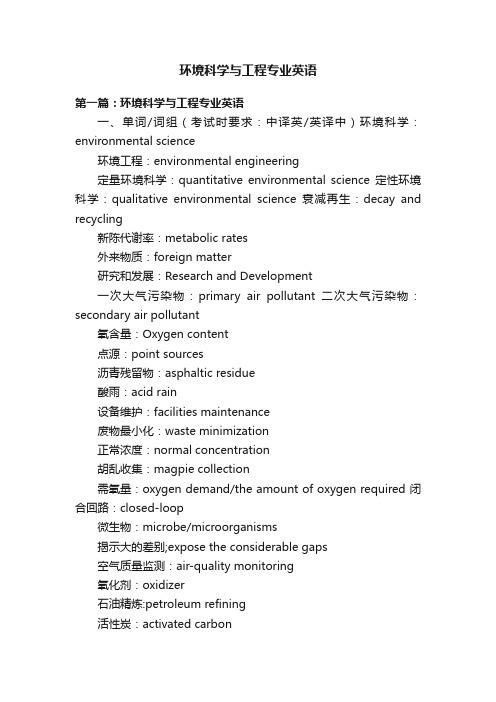
环境科学与工程专业英语第一篇:环境科学与工程专业英语一、单词/词组(考试时要求:中译英/英译中)环境科学:environmental science环境工程:environmental engineering定量环境科学:quantitative environmental science 定性环境科学:qualitative environmental science 衰减再生:decay and recycling新陈代谢率:metabolic rates外来物质:foreign matter研究和发展:Research and Development一次大气污染物:primary air pollutant 二次大气污染物:secondary air pollutant氧含量:Oxygen content点源:point sources沥青残留物:asphaltic residue酸雨:acid rain设备维护:facilities maintenance废物最小化:waste minimization正常浓度:normal concentration胡乱收集:magpie collection需氧量:oxygen demand/the amount of oxygen required 闭合回路:closed-loop微生物:microbe/microorganisms揭示大的差别;expose the considerable gaps空气质量监测:air-quality monitoring氧化剂:oxidizer石油精炼:petroleum refining活性炭:activated carbon质量控制:quality control海轮:ocean liner挥发性化学物质:volatile chemicals沙漠化:desertification火山喷发:volcanic eruption间歇源:intermittent sources衡量浓度:trace concentrations氯化物和硫化物:chlorides and sulphates风化:wind erosion不完全燃烧:incomplete combustion化石燃料:fossil fuels液滴:liquid dropletsSO3:sulfur trioxidefor managerial and administrative reasons行政管理上的原因stacks of generating stations许多发电站Roman empire罗马皇帝Cloaca maxima 古罗马的大排泄沟Wate phosphorous 亚磷的(三价磷)phosphorous acid亚磷酸phosphoric磷的(五价)carbonates,bicarbonates碳酸盐,碳酸氢盐carbohydrates碳水化合物,主要含氢和碳TOC(total organic carbon)总有机碳COD(chemical oxygen demand)化学需氧量BOD(biological oxygen demand)生化需氧量Biodegradable organic可生物降解的有机物BOD5BOD的测试标准化rborne diseases 水传染的疾病epilimnion 表层水hypolimnion深水层thermocline热变形层become depleted of oxygen 缺氧二、重点句子翻译UNIT21.Environment is the physical and biotic habitat which surrounds us;that which we can see,hear,touch,smell,and taste.环境是围绕在我们周围物质生命的栖息地,在那里我们可以看到,听到,触到,闻到和品尝到。
英国诺丁汉大学中英文翻译与口译文学硕士的全面介绍

英国诺丁汉大学中英文翻译与口译文学硕士的全面介绍学校名称:英国诺丁汉大学 The University of Nottingham所在位置:英国创建时间:1881年QS排名:143学费:70000 人民币录取率:0.5诺丁汉大学建于1881年,在1948年获得皇家特许成立为大学,英国连续评为前10名重点大学和综合性大学。
并且以其出色的教学质量赢得国际声誉。
诺丁汉大学在中国宁波和马来西亚吉隆坡建有海外校区。
英国诺丁汉大学曾荣获英国“女王企业奖”和“女王高等教育年度奖”。
在2016年QS世界大学排名中排名第70位,2016Times 大学排名中排名25位。
接下来86店铺为大家介绍一下诺丁汉大学中英文翻译与口译文学专业怎么样。
中英文翻译与口译文学硕士Chinese/English Translation & Interpreting MA中英文翻译与口译文学硕士专业描述:这一交叉学科课程整合了高效率中英文翻译的理论,教学与必要实践训练。
同时提供两种语言之间的双向交流训练与实践。
另外通过翻译与口译的专业课程,你也学习高级英语或是高级中文。
你也可以选择一系列的可选课程,来获得或是开发除中英文以外的其他语言。
你还可以针对技术翻译目的或是获得不同领域知识来继续你现有的专业。
学制:1学年专业领域:英语语言研究学学费:10610英镑/学年课程层次:硕士学位课程(授课类)申请费:N/A入学日期:9月中英文翻译与口译文学硕士就业方向:中国经济的腾飞使中国在世界经济中占据主导地位,在各国经济往来中对中英翻译的人才的需求也在不断增加。
该专业旨在培养学生成为中英专业的翻译员。
该专业毕业的学生适合在各国际企业中从事商务翻译的角色,也可进行教学或进行语言研究。
中英文翻译与口译文学硕士入学要求:学历要求:学士学位语言要求:雅思7.0(不少于6.0分的单科成绩)中英文翻译与口译文学硕士申请材料:1、学历证明及成绩单;2、英语成绩单(可先申请有条件录取,后提交英语成绩单);3、申请表;4、工作经验证明(如有,请提供);5、推荐信两封(如果已工作,则其中一封为工作相关领导的推荐信)。
宁波诺丁汉的专业缩写

IB=International Business 国际商务IBM= International Business Management 国际商务管理IBC= International Business with Communications Studies 国际商务与国际传播学IBL= International Business with language (French, German, Spanish, Japanese) 国际商务与语言BE= International Business Economics 国际商务经济学I BE u= International Business with European Studies 国际商务与欧洲学FAM= Finance Accounting and Management 金融财务与管理IET= International Economics and Trade 国际经济与贸易(新增)IS=International Studies 国际问题研究系(国际事务与国际关系)IC= International Communications 国际传播系(国际文化交流)ES= English Studies 英语语言系CS=Computer Science 计算机科学系CSM=Computer Science and Management 计算机科学及管理AEE=Architectural Environment Engineering 建筑环境与设备工程Architecture 建筑学(新增)Civil Engineering 土木工程Environmental Engineering 环境工程Mechanical Engineering 材料成型及控制工程Chemical Engineering 化学工程和工艺Electrical and Electronic Engineering 电气工程及自动化Environmental Science 环境科学。
PrinciplesofEnvironmentalPhysics环境物理学原理简介

《Principles of Environmental Physics》(环境物理学原理)简介一、出版情况《环境物理学原理》(第三版)2008年由美国Academic Press出版,作者为诺丁汉大学(University of Nottingham)的John L. Monteith教授和俄勒冈州立大学(Oregon State University)的Mike H. Unsworth教授,全书共418页。
本书可作为物理学、生物学、环境科学专业的本科生和研究生教材,也可以供从事环境科学与物理学交叉学科研究的研究者参考。
二、内容简介《环境物理学原理》(第三版)主要介绍植物和动物对于环境变化的复杂反应,为分析和阐明生物体与物理环境之间的相互作用提供理论基础。
该书着重介绍能量、物质和动力迁移,结合1990年第二版出版以来环境物理学的学科发展,在第三版中增加和扩充了人类活动对于全球大气特征和气候变化的影响的相关内容,主要包括:(1)温室气体排放对全球气候的影响;(2)气溶胶对气候的影响;(3)颗粒物的迁移和沉降,包括动物对颗粒物的吸入;(4)动物和人体的热平衡;(5)应用微气象学的最新进展和理论,研究农作物和森林的碳和水的输入和输出;(6)新增大量彩图、习题及答案和参考文献。
三、目录1.环境物理学的研究内容2.气体和液体的性质气体和水蒸气;液体;稳定同位素。
3.热、物质和动力迁移普通迁移方程;分子迁移过程;扩散系数。
4.辐射能的迁移辐射的来源和特征;空间关系。
5.辐射环境太阳辐射;太阳辐射在大气中的衰减;到达地面的太阳辐射;地面辐射;净辐射。
6.辐射的微气象学(ⅰ):吸收、反射和传播天然材料的辐射特征。
7.辐射的微气象学(ⅱ):固体对辐射的阻截几何学原理;辐射的传播。
8.辐射的微气象学(ⅲ):植物和动物对辐射的阻截植物树冠对辐射的阻截;动物毛皮对辐射的阻截;净辐射。
9.动力迁移边界层;自然表面的动力迁移;风力对植物的作用。
宁波诺丁汉大学环境科学(2+2)专业介绍

宁波诺丁汉大学环境科学(2+2)专业介绍这门课程培养学生对于生态环境进程和系统最基本的科学认识,学生将学习不同社会,经济,政治和文化环境的系统。
同时,这门课程培养学生收集,处理以及分析环境数据的能力,这些能力最终将有助于完善和评估环境政策以及实践环境管理技术。
这门课程具有综合学科的性质,涉及生物科学和地理科学两个学院以及工程学院下的化学和环境工程系。
学生接触到从各种角度对环境过程及其他问题的观点,受益无穷。
多样化的课程设置使学生能依据个人兴趣、就业热诚为自己量身订做一个学位规划。
以教授实际以及可迁移性技能为重点的教学方式贯穿整个课程。
- 1、下载文档前请自行甄别文档内容的完整性,平台不提供额外的编辑、内容补充、找答案等附加服务。
- 2、"仅部分预览"的文档,不可在线预览部分如存在完整性等问题,可反馈申请退款(可完整预览的文档不适用该条件!)。
- 3、如文档侵犯您的权益,请联系客服反馈,我们会尽快为您处理(人工客服工作时间:9:00-18:30)。
UNIVERSITY OF NOTTINGHAMPROGRAMME SPECIFICATIONA.Basic Information1. Title Bachelor of Science with Honours Environmental Science2. Course code TBA3. School managing the courseSchool of Geography, University of Nottingham (UK) 50% and Division of Engineering, University of Nottingham, Ningbo, China (50%).N.B. The School of Geography and the Division of Engineering at UNNC will be equal partners in terms of programme delivery. However, the School of Geography at UoN will have full ownership of and responsibility for m aintaining and updating the programme specification, including the foundation and qualifying year at UNNC. Of course, the common foundation year and autumn sem ester in the qualifying year for all courses at UNNC makes it necessary to work in partnership and consultation with the whole faculty and UNNC.4. Type of course∙Single subject5. Mode of delivery∙Full-tim e∙International cam pus (Ningbo) and Nottingham (2+2)6. Accrediting bodyNot applicable7. Relevant QAA subject benchmark(s)Environmental Sciences (2007), Geography (2007)B: General InformationEducational AimsThe aim of the Environmental Science degree is to m otivate students through the provision of a research-led teaching and learning programm e within a high quality, stim ulating and flexible yet structured course employing both traditional and modern teaching methods. The objective degree is to enable students: ∙To engage in the study of Environmental Science, environmental management and environmental sustainability issues,∙To develop personal and inter-personal skill and the technical skills to synthesise descriptive and numeric al information in EnvironmentalScience∙To develop the intellectual capacity to com e to sound and practi cal conclusions∙To prepare for and to develop a career in environmental management and sustainability.In addition the Environmental Science degree aim s to:∙To enhance lifelong learning skills and personal development to contribute to Society at large∙To provide a structured yet flexible programme reflected in optional pathways that allow students to tailor their programme of study to theirown specific interests and career aspirations∙To provide a learning environment in which students are encouraged to engage in a reflective evaluation of their academic and personal progressand development.Outline Description of the CourseThe Environmental Science programme is a full-tim e degree studied over four years leading to the award of a BA single honours degree.The first year programm e is designed to provide a common foundation for all undergraduate degree courses offered by the University of Nottingham at Ningbo for students who have com pleted 11 or 12 years of secondary education in China. The developm ent of a common year 1 is a response to the particular characteristics of the m arket for higher education in China, where four year undergraduate programmes are the norm, and to the need for an initial intensive immersion in the English language in order to com pensate for the absence of the natural linguistic and cultural environment that they would encounter in daily life on an equivalent programme in the UK.Year 1 consists of three teaching blocks of 10 weeks each. It is assum ed at the beginning of the year that:♦Students will have a reasonable passive knowledge of the language system of English but not necessarily know how to apply it.♦Students’ knowledge of the language system will be of a general rather than academic nature.♦Students will be new to studying at HE level.♦Students will be unfamiliar with British cultural and academ ic norms and expectations.♦Students will be new to the academ ic subjects they will study at UNNC.Year 1 aim s to take into account all of the above to provide a broad practical introduction and grounding to study for all students.The non-credit bearing Block 1 is principally designed to develop language skills, activating knowledge of the English language that students m ay already have in a passive form, with particular focus on introducing them to tasks that will be ofuse in later academic m odules. There are no academic modules in this block and no formal assessment. This is to allow students to overcom e any initial difficulties and settle into the new learning environment. Nevertheless, students will be asked to carry out similar activities to those that will be assessed in future modules, and formative feedback will be given. Student performance will be monitored informally by the tutors with the aim of offering further languageand/or academ ic support in Blocks 2 and 3 for students who need it.Block 1 will begin with a one week orientation programme for students, followed by a nine week programme consisting of 18 - 20 hours of taught classes per week. The students will be tested for English language ability at the beginning of the block and grouped in class accordingly.Blocks 2 and 3, each of ten weeks in duration, consist of a num ber of credit-bearing modules. All modules in year 1 are com pulsory and common to all degreeprogrammes, except in Block 3, where Business students are separated from the others for one 10 credit m odule. There is a brief assessm ent period after each block which m ay be utilised according to the assessm ent requirements of the individual modules. Taken together, Blocks 2 and 3 give 120 credits. Each 10 credit module represents 100 hours of student learning.It is still assumed in Blocks 2 and 3 that students will need substantial tuition and support to develop the English language and study skills needed to succeed in their chosen courses. Academic English modules therefore account for 50% of the credits in year 1. However, there is also the need to introduce students to the academic subject knowledge and approaches that will be developed more fully in ‘content’ m odules in year s 2 – 4 (the equivalent of a full programme at Nottingham, UK). The other m odules in year 1 are designed to fulfil this function and the English m odules complement them by employing directly related subject matter as a m edium through which to develop language skills.For years 2-4, the academic year is divided into two sem esters (Autumn and Spring) that consist of appropriately 12 weeks of teaching followed by integral periods of revision and assessm ent.The structure of the Environmental Science programme is modular, with individual modules each having a weighting of 10, 15, 20 or 40 credits. One credit represents 10 hours of student work, meaning that a 10 credit m odule represents 100 hours of study including form al teaching, independent study, revision, and the preparation of assessm ents. An Honours degree requires the successfulcom pletion of 360 credits beyond the foundation level, 120 of which are taken in each subsequent year. The second year is called the Qualifying year, which m ust be passed for progression to Part I (third year) and Part II (fourth year) of the degree. Part I counts for 30% of the final degree classification, and Part II for 70%.In the Qualifying Year students are introduced t o the underlying core disciplines of Environmental Science. Also in the Qualifying Year, students have to take core modules in Geographical Information Science and quantitative m ethods. These modules are supported by bi-weekly tutorials to support the learning process. In aggregate, the Qualifying Year thereby provides a foundation for Part I of the degree, in which core m odules are taken in data handling, field techniques and communications in Environmental Science with a wide choice of m odules organised in thematic pathways. Part II of the degree develops these them atic pathways with emphasis changing to the social and cultural and economic implications of m anagem ent of key issues in Environmental Science.C: Supplementary regulations1. Admissions RequirementsDirect entryDirect Entry is for applicants from Zhejiang province only.Applicants should have achieved at least five ‘A’ levels in their graduation exam for senior high school, and all other results should be at least ‘B’ level. For Arts students, English and Chinese must be ‘A’ while for Scienc e students,Mathem atics and English must be ‘A’. The student can have one ‘A’ tocom pensate for a ‘C’ if he has 6‘A’s. If som e key high schools don’t provide this exam, the student should rank in the top half of his school record ranking listduring the senior high school years (by converting the results of related examinations).Applicants will sit Nottingham entrance tests, which include written and oral tests. Students m eeting the entry requirements can be admitted subject to Direct Entry intake quotas.Gaokao entryStudents should attain above the first division university entry score, with an English score of 115 or above.Zhejiang province students admitted through Direct Entry m ust be referred byone of 10 authorised high schools. Gaokao students must reach 50 plus the university’s entry score, in order to apply for the 4+1 programme.Students m eeting the following two requirements can apply for direct entry to the second year:1. The Gaokao score reaches the entry score of Fudan University, Zhejiang University, Renming University, Peking University, and Qinghua University, Nanjing University, Wuhan University, Nankai University, University of Science and Technology of China and Hong Kong University.2. IELTS score 6.5 (minimu m 6.0 in writing). IELTS score is 6.5, or TOEFL score 575 (no less than 4.5 in the Test of Written English); computer based score 232 (no less than 4.5 in essay rating).Other entriesAS Level with grades BBB graduates can apply for first year study. The typical IB offer is 32, and the typical offer for A level is BBB for direct entry to the second year.International school graduates with non-standard qualifications will normally be asked to attend an interview.English as a second langua ge students must apply with either an IELTS or TOEFL score. The minimu m requirement for university entry is 5.5 and 525, with acom puter based score of 195 (no less than 4.0 in essay rating). For second-year direct entry students, the m inimum requirement is 6.5 and 575 (no less than 4.5 in the Test of Written English) and a com puter based score of 232 (no less than 4.5 in essay rating).2. Course StructureFirst Year Programme (Year 1)Compulsory ModulesStudents must take all modules in this groupQualifying Year (Year 2)Compulsory ModulesStudents must take all modules in this groupPart 1 (Year 3)Compulsory ModulesStudents must take all modules in this groupRestricted GroupsStudents must take 20 credits from this groupAndStudents must take a minimum of 40 credits from this groupOptional ModulesStudents can take up to 20 credits from this groupPart 2 (Year 4)Compulsory ModulesStudents must take all modules in this groupRestricted GroupsStudents must take a minimum of 20 credits from this groupAndStudents must take 40 credits from this groupOptional ModulesStudents can take up to 20 credits from this group3. Assessment criteriaProgression Information:This programme will comply with the University Undergraduate taughtassessm ent regulations which can be found at:/qualit y-manual/study-regulations/ undergraduat e-regulations.htm Students must pass the Qualifying Year module Interpreting Environm ental Data to progress to Part I of the degree.Degree Information:Assessm ents are marked in line with the School of Geography Undergraduate Marking Criteria, as contained in our Undergraduate Student Handbook.The primary criterion for the award of a degree is the student's rounded, credit-weighted arithm etic m ean over Part I and Part II of their degree, weighted 30% and 70% respectively. The credit-weighted arithmetic m ean determines the degree classification and boundaries as follows:70+ 1st68-69 Borderline II-160-67 II-159 Borderline II-150-58 II-249 Borderline II-240-48 III39 Borderline IIIl38- FailBorderline Degree Classes:The following profile algorithm is applied to candidates within each borderline to determine if the degree class should be raised:∙The num ber of Part II modules in higher and lower classes than the appropriate borderline are counted. 10 credit m odules and the dissertation are given a score of 1. 20 credit m odules are given a score of 2.∙The total score equals 9∙If the score is 5 or more within the higher class or higher classes then the higher class is awarded∙If the score is 4 within the higher class or higher classes an External Examiner makes an assessm ent of the case, which might include a viva voceexamination. The External Examiner will recommend either promotion to the higher degree class or retention of the lower degree class.∙If the score is <4 in higher class or higher classes then the lower degree class is awarded.In the event of a degree class being raised the transcript of m arks for the final degree will show the original (borderline) mark but will have an endorsement explaining why the classification was raised.Course Weightings %Part I: 30.0Part II: 70.0D: Learning OutcomesT he programme provides opportunities for students to achieve knowledge and understanding together with generic and discipline-specific skills for:∙the successful com pletion of a Honours degree in Environmental Science,∙to enhance em ployment prospects and∙to facilitate and sustain life-long learningas specified in the following QAA national benchm arks for Environmental Science and Geography:a.Knowledge and understanding∙ a systems approach to understanding the present and past interactions between the processes operating in the lithosphere, cryosphere, hydrosphere, atmosphere andbiosphere, and the perturbations of these systems by extraterrestrial influences ∙problem-solving and modelling related to environmental phenomena∙the monitoring and management of natural and human-induced environmental changes and the implications for sustainability andsustainable development.Teaching/learning methods and strategies:Core knowledge and understanding is gained via lectures, tutorials, practicals, seminars (both student and teacher led), fieldwork and a significant proportion of guided independent study. In later sections of the programme the above are supplemented by group team work, laboratory classes and pathway-specific residential field courses.Assessments:Knowledge and understanding is assessed through examinations, coursework essays, project reports, fieldwork reports, web pages, posters and group and individual presentations.b. Discipline-specific skills.∙Evaluate the diversity of specialised techniques and approaches involved in formulating research design and collecting environmental information (e.g.instrumentation, remote sensing, observation and the use of textual andarchival sources)∙Evaluate the diversity of specialised techniques and approaches involved in analysing environmental information (e.g. field based research and special techniques for the analysis of spatial information, GIS, laboratorytechniques, qualitative and quantitative tec hniques for the analysis ofenvironmental information)∙Evaluate the diversity of specialised techniques and approaches involved in presenting environmental information (e.g. GIS, cartography and different textual strategies)Teaching/learning methods and strategies:Discipline specific skills are promoted through field classes (both teacher and student led), practical laboratory and com puter classes and lectures. Most of these skills are addressed by a programme of core lectures and practical classes which are compulsory for all students. From the beginning of the programme students are m ade aware of the safety and ethical aspects of fieldwork and data gathering exercises. A significant proportion of the degree is derived from the dissertation that encourages the student to independently practice m any of the discipline specific skills acquired during the programme, after appropriate consultation with an advisor with regarding to m ethodologies to be em ployed. Assessments:Discipline specific skills are assessed via portfolios of m aps, fieldwork, project and laboratory reports, field notebooks, web pages, posters, presentations and the dissertation, part of the m ark for which is specifically related to the level ofcom petence in these skills.c. Intellectual skills∙Illustrate and discuss the contested and provisional nature of knowledge and understanding∙Identify, formulate and evaluate questions or problems∙Develop a sustained and reasoned argument∙Articulate and communicate personal views about environmental issues including the weaknesses in the arguments of others∙Apply ideas to new situationsTeaching/learning methods and strategies:Intellectual skills are promoted through lectures, tutorials, seminars and group discussions. The application of these skills is encouraged through project based field courses and case studies within modules.Assessments:Intellectual skills are assessed through tutorial and coursework essays and examinations. The dissertation allows the student to dem onstrate these skills to the highest level.d. Key skills∙Communicate environmental ideas, principles and theories effectively and fluently by written, oral and visual m eans∙Effectively and appropriately interpret and use nume rical statistical information∙Undertake independent/self-directed study/learning (including tim e management) to achieve consistent, proficient and sustained attainm ent ∙Work as a participant or leader of a group and contribute effectively to the achievem ent of objectivesTeaching/learning methods and strategies:Key skills are promoted through tutorials and core m odules within the degree programme which are com pulsory for all students. Virtually all Part II, and many Part I, optional modules involve the development of these skills throughteam work and/or role-play and seminar presentations.Assessments:Key skills are assessed through both teacher and peer evaluation of seminar presentations, coursework essays, posters, web pages, examinations and the dissertation.。
